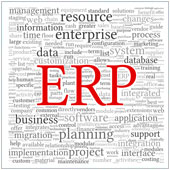 Implementing new business systems is never easy, but the alternative can cause you a lot more pain. Trying to get by with the accounting system that got you started so many years ago may be frugal, but is it wise? ERP (Enterprise Resource Planning) systems have become more affordable and easier to support through cloud options.
Implementing new business systems is never easy, but the alternative can cause you a lot more pain. Trying to get by with the accounting system that got you started so many years ago may be frugal, but is it wise? ERP (Enterprise Resource Planning) systems have become more affordable and easier to support through cloud options.
There are many ways that your business will benefit from upgrading to modern systems that take advantage of the latest technology. Let’s look at some of the top requirements for businesses today and how ERP solves them.
- Need to make decisions fast. With ERP you can deliver reports and dashboards that combine data from every department to your managers no matter where they are.
- Highly productive employees. With the high cost of providing benefits to employees, you need to keep them focused on making money, not filling out forms. ERP will automate many of the manual processes that workers now waste precious time doing.
- Promote great customer service. It’s never been easier for customers to find a new supplier. ERP connects the information across the organization so that you can answer your customer’s questions fast and accurately, every time.
- Support multiple distribution channels. To expand your reach in the market, you need to support internet, channel and direct distribution. ERP will connect all your systems to central inventory and supply chain to expand your horizons.
- Accurately match costs with income sources. When you take on new projects, you need to know whether you are really making a profit on them. ERP will allow you to track all the costs related to projects or jobs to ensure profitable engagements.
- Support remote employees. Employees need to be productive in the field or at home. ERP systems will allow remote workers to access and enter information via the web, wherever they are working.
- Manage industry-specific requirements. Your business is unique and accounting systems generally aren’t. With ERP, you can build workflows and reports that simplify the specialized requirements of your industry.
- Simplify compliance. Meeting the reporting requirements like IFRS, Sarbanes-Oxley and others can take a huge manual effort. Instead of spending weeks and months combining spreadsheets, your accounting team can use ERP to focus on more productive tasks.
- Support global commerce. If you are doing business across boundaries, you need ERP to help you translate currencies and support workers in other countries.
- Attract young workers. Young people have no patience doing manual tasks they know can be simplified with technology. With ERP you can simplify work for everyone and show younger workers you will stay relevant in a changing world.
Replacing your accounting system with updated ERP system will help every department in your business. With the affordability of ERP and the ease of supporting applications through the cloud, the reasons to keep your old accounting system going are dwindling. Let’s talk about your growing options with ERP.